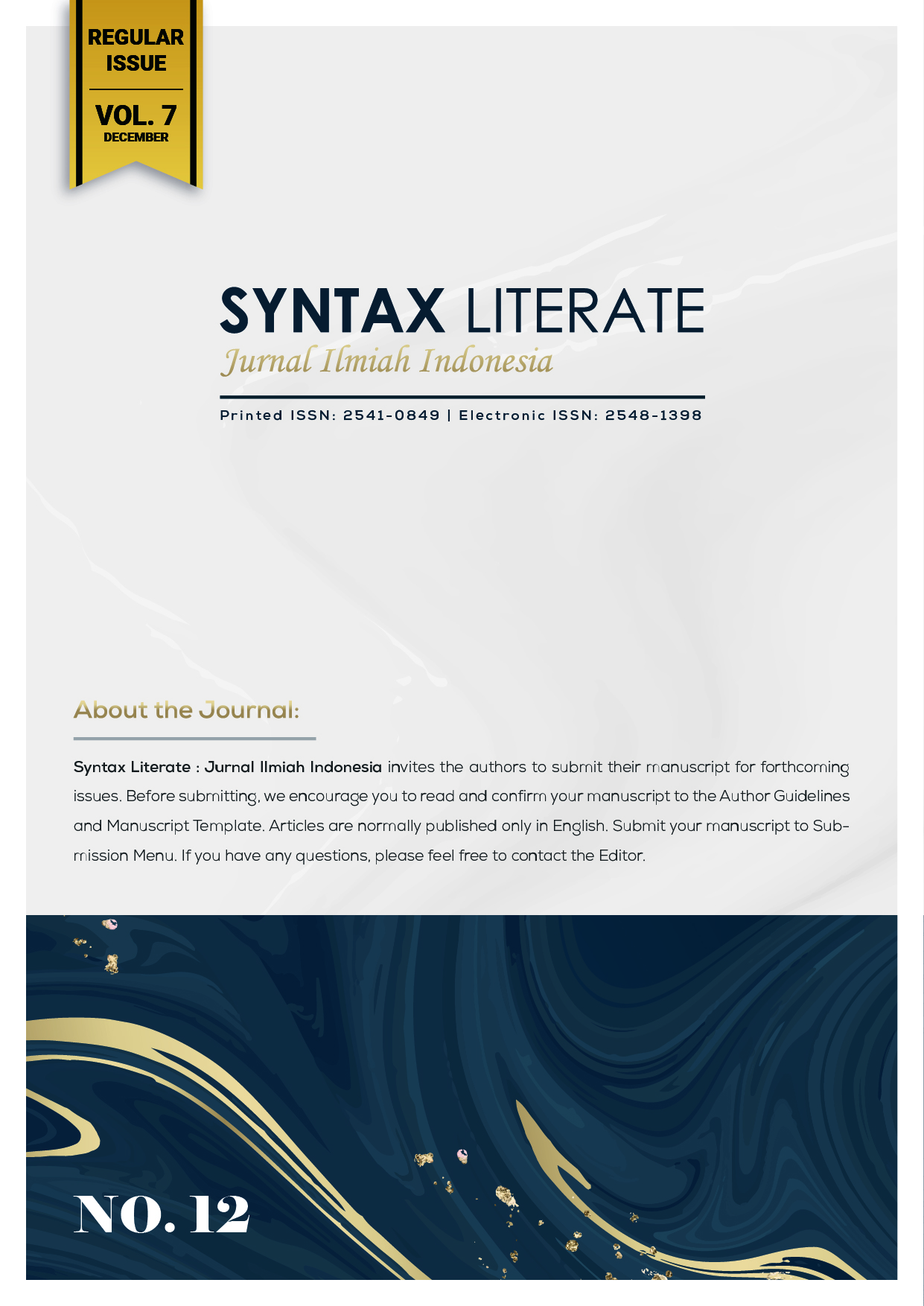Teenagers Perception Of Committed Relationship On Their Parents Infidelity In North Sumatra
Abstract
The purpose of this study was to describe the committed relationship on teenagers whose parents experienced an infidelity to divorced. This study uses a qualitative method with a phenomenological approach. Qualitative is one of the methods used in research that focuses on understanding the meaning of individuals or group originating from a problem in social life (Creswell, 2016). The data collection technique used in this study was to conduct interviews and observations with five informants aged 17 to 21 who live in North Sumatra. Then the data that has been collected will be analyzed by researcher to be more structed. The result of this study is a description of how parental infidelity bring an impact to the teenager’s perception in seeing a committed relationship. Divorce parents brings positive and negative impacts on teenagers. moreover, there are some things that are quite different between participants were them who has a low level of communication with their cheating parents tend to have high trust issues problems.
Downloads
References
Amelia, Nanda, Rahmania, Tia, & Dewi, Mulia Sari. (2020). Description Of Ethical Perception About Corruption Measures In Youth Who Have Parents With Corruption Behavior.
Apostolou, Menelaos, & Demosthenous, Andriana. (2021). Why people forgive their intimate partners’ infidelity: A taxonomy of reasons. Adaptive Human Behavior and Physiology, 7(1), 54–71.
Aziz, Mukhlis. (2015). Perilaku sosial anak remaja korban broken home dalam berbagai perspektif (Suatu penelitian di SMPN 18 kota Banda Aceh). Jurnal Al-Ijtimaiyyah, 1(1).
Balderrama-Durbin, Christina M., Allen, Elizabeth S., & Rhoades, Galena K. (2012). Demand and withdraw behaviors in couples with a history of infidelity. Journal of Family Psychology, 26(1), 11.
Blodgett Salafia, Elizabeth H., Schaefer, Mallary K., & Haugen, Emily C. (2014). Connections between marital conflict and adolescent girls’ disordered eating: Parent–adolescent relationship quality as a mediator. Journal of Child and Family Studies, 23(6), 1128–1138.
Creswell, John W. (2016). Pendekatan Metode Kualitatif. Kuantitatif Dan Campuran: Yogyakarta: Pustaka Belajar.
Cui, Ming, & Fincham, Frank D. (2010). The differential effects of parental divorce and marital conflict on young adult romantic relationships. Personal Relationships, 17(3), 331–343.
Dean, Christian J. (2011). Psychoeducation: A first step to understanding infidelity-related systemic trauma and grieving. The Family Journal, 19(1), 15–21.
Dilham, Ami, Meliany, Yeti, & Sofiyah, Fivi Rahmatus. (2021). Antecedents Confidence, Orientation Purpose, Orientation Moral and Conformity of Cheating Students With Self Efficacy As An Intervening Variable (Case Study In Students In Medan). NVEO-NATURAL VOLATILES & ESSENTIAL OILS Journal| NVEO, 10874–10883.
Evanita, Susi, & Trinanda, Okki. (2017). Minangkabau traditional food vs modern snacks: The influence of product attributes on teenagers buying interest in West Sumatera’s urban cities.
Fish, Jessica N. (2010). Characteristics of those who participate in infidelity: The role of adult attachment, identity, and differentiation in extradyadic experiences.
Fish, Jessica N., Pavkov, Thomas W., Wetchler, Joseph L., & Bercik, Jerry. (2012). Characteristics of those who participate in infidelity: The role of adult attachment and differentiation in extradyadic experiences. The American Journal of Family Therapy, 40(3), 214–229.
Lubis, Rahmi, Hinduan, Zahrotur Rusyda, Jatnika, Ratna, & Agustiani, Hendriati. (2021). Qualitative Research: Family Function and Sexual Intention Based on Theory of Planned Behavior on Middle Adolescents in Medan. 1st Paris Van Java International Seminar on Health, Economics, Social Science and Humanities (PVJ-ISHESSH 2020), 768–772. Atlantis Press.
Matondang, Armansyah. (2014). Faktor-faktor yang mengakibatkan perceraian dalam perkawinan. JPPUMA: Jurnal Ilmu Pemerintahan Dan Sosial Politik UMA (Journal of Governance and Political Social UMA), 2(2), 141–150.
Moller, Naomi P., & Vossler, Andreas. (2015). Defining infidelity in research and couple counseling: A qualitative study. Journal of Sex & Marital Therapy, 41(5), 487–497.
Moné, Jennifer Gerber, MacPhee, David, Anderson, Sharon K., & Banning, James H. (2011). Family members’ narratives of divorce and interparental conflict: Implications for parental alienation. Journal of Divorce & Remarriage, 52(8), 642–667.
Thorson, Allison R. (2009). Adult children’s experiences with their parent’s infidelity: Communicative protection and access rules in the absence of divorce. Communication Studies, 60(1), 32–48.
Wallerstein, Judith S. (2005). Growing up in the divorced family. Clinical Social Work Journal, 33(4), 401–418.
Copyright (c) 2023 Sauli Safitri, Lucy Pujasari Supratman

This work is licensed under a Creative Commons Attribution-ShareAlike 4.0 International License.











